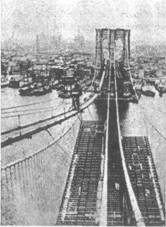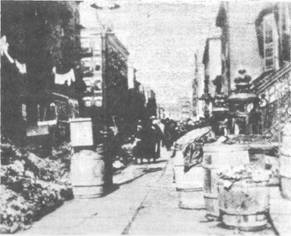Over a period of time that went on and on and on forever, I forced myself through step after step, the thin handhold sliding through my clenched hand till my palm was raw and black with dirt. Then finally I stepped off onto the top of the Brooklyn tower, wonderfully solid under my feet, beautifully wide; and I stood swallowing, feeling the sweat of imminent disaster drying on my face.
This is the shot I got up there and I'm proud of it. The two men who had been walking across the bridge behind me, I saw, had stopped in the middle for the view, one of them actually leaning back against the wire handhold; I could hardly look at him. But isn't it a tremendous view? That's Trinity off in the distance to the far left. I felt great now, very glad that I'd — bravely, I tried to tell myself — made the trip across. But I took the ferry back to Manhattan.

And within fifty yards I was deep in the slums and within two blocks had seen far more than I wanted to see; the one photograph I took there will show you why. The sidewalks were clear of snow, but were filled with trash barrels as though there hadn't been a collection in weeks, as I expect there hadn't. And the streets were worse, the gutters piled with snow that was almost completely covered with mounds of garbage and refuse, dirt, and filth of all kinds. Here's the shot I took. We don't care very much about what happens to our poor, but the nineteenth century cared even less, it seems to me.

I suppose it was cowardly, but there was nothing at all I could do about this, and it was too depressing; walking fast, I headed straight across town toward City Hall Park; I wanted out of there. When I reached Park Row, I glanced left, saw the Times Building and directly beside it the building in which Jake had his secret office, and at the sight of it the thought flared up in my mind like a rocket: They won't stay in the park! For a moment I stood motionless on the walk. How could I have missed it? What kind of woolly-headed lack of thought had made me picture Pickering and Carmody sitting across the street there in the park — in the dark of midnight!
I turned onto Park Row toward the Potter Building. And I knew it was true. Jake wouldn't bring whatever documents he had into the park — to be possibly taken by force by whomever Carmody might have hiding there. And he'd want to count the money besides. As for Carmody, he wouldn't be handing over the money till he'd actually examined Pickering's documents. They'd go to Jake's office for this transaction; they had to. There was no way for me to overhear the meeting.
I stopped on the walk and stood staring up at the building; I wasn't thinking of photographs now. The building hadn't changed: The upper stories were four identical rows of narrow arch-topped windows that had nothing to say to me; the storefronts of the street level were dirty-windowed as ever, their summer awnings ripped and torn, folded back to the wall, the grillwork protecting the windows' rusting and flaking paint; they had no hope for themselves, and none to offer. I glanced up at the long narrow signs identifying the offices of the chief tenants, which hung under some of the upper-story windows like those on the faces of most lower-Broadway buildings. They hung tilted outward, to be read from the street, and as I had once before I read them again. TURF, FIELD AND FARM, said the raised gold letters on the long black-painted background hung under a row of fourth-floor windows; THE RETAILER, said another, and THE SCOTTISH AMERICAN, a third. Under a row of third-floor windows hung SCIENTIFIC-AMERICAN, and — with no more interest than I had in the rest — I glanced again at the sign I would never forget: THE NEW-YORK OBSERVER.
For no particular reason except to see the other faces of the building — which looked the same as the first, I found — I walked around the building, along Beekman Street, then turned into Nassau Street, and I entered through the Nassau Street entrance. This time when I stepped into the vestibule there was no sound of sawing or pulling of nails, and when I climbed the stairs to the second floor the doorway of the office I'd seen the carpenters in was closed. Not only closed, but now the doorway was solidly boarded across, floor to ceiling, and painted with warnings; obviously they'd finished removing the floor in there. Climbing to the third floor, I thought they might be working up there now, or about to begin, and that somehow this might give me the chance I needed.
But everything looked the same on the third floor. If they'd been working up here since my last visit, they weren't now; the door was padlocked as before, the same red-painted warning across it. Once again I tried the door to Pickering's office, but without hope, and it was locked.
Nothing had changed; I squatted down, looked in through the keyhole, and once again I saw the rolltop desk and the chair across the room before the tall thin window; and the connecting boarded-up doorway to the right. Then I straightened, and just stood there in the hall, helplessly. There was simply no way to get in. Yet I had to. I stood trying to think of everything I'd ever heard about breaking into a locked room. Slide a strip of plastic or celluloid into the door jamb and it could push back the lock, said stories I'd read. But that was a kind of lock not in use yet; this was a different kind with no spring to push back. There was no way to get in; I stood in that narrow corridor, lighted by a single open-flame gas jet, staring angrily and stubbornly at that locked door. Someone came up and someone went down the staircase off to my right, and each time I turned — camera at my side, hanging by its strap now — and walked toward the main corridor as though I were leaving. When the footsteps receded I returned.
I couldn't leave; I was hypnotized. I thought wildly of such things as coming hand over hand down a rope from the roof to the window of Room 27 or the closed-up room next to it. Or of somehow climbing up into the half-finished elevator shaft to the underside of the third floor, and then… then what? I didn't know.
I heard the preliminary rattle of a door about to be opened in my corridor, and turned swiftly, walking to the stairs ahead of whoever came out of an office behind me. I went up the staircase, he went down, then I turned and came back and once more stood helplessly and stubbornly in the corridor. A minute passed, I suppose; I knew I might as well leave, but couldn't.
Soft shuffling footsteps — carpet slippers, so that I didn't hear them before they turned the corner into my corridor — sounded directly behind me, and I whirled around. The old janitor was walking slowly toward me, head ducked as he squinted at a little stack of letters he was shuffling through his hands. He hadn't seen me yet, but the moment he raised his head he would; the corridor was much too narrow for me to sneak past him, and there was no other place I could go. I had time to arrange a pleasant smile, then he looked up, stopped, and stood frowning at me; he'd seen me before, he knew that, but he couldn't place me.
Then suddenly he remembered, and nodded. "Morning, Mr. Pickering; no mail for you," and he walked on past me, sliding envelopes under some of the numbered doors. Nothing happened inside my brain. During the fifteen seconds or so it took him to reach the end of the short corridor, turn, and come back, I just stood looking at him. Again he looked up at me, and now he was irritated. "What's the matter; forget your key?" he said, and before I could reply he was shaking his head in angry refusal. "Got no duplicate, not for that door! Supposed to have, and used to have; yes. But it's gone now. I can't help you! You'll have to go home and get your own. I got no time —»